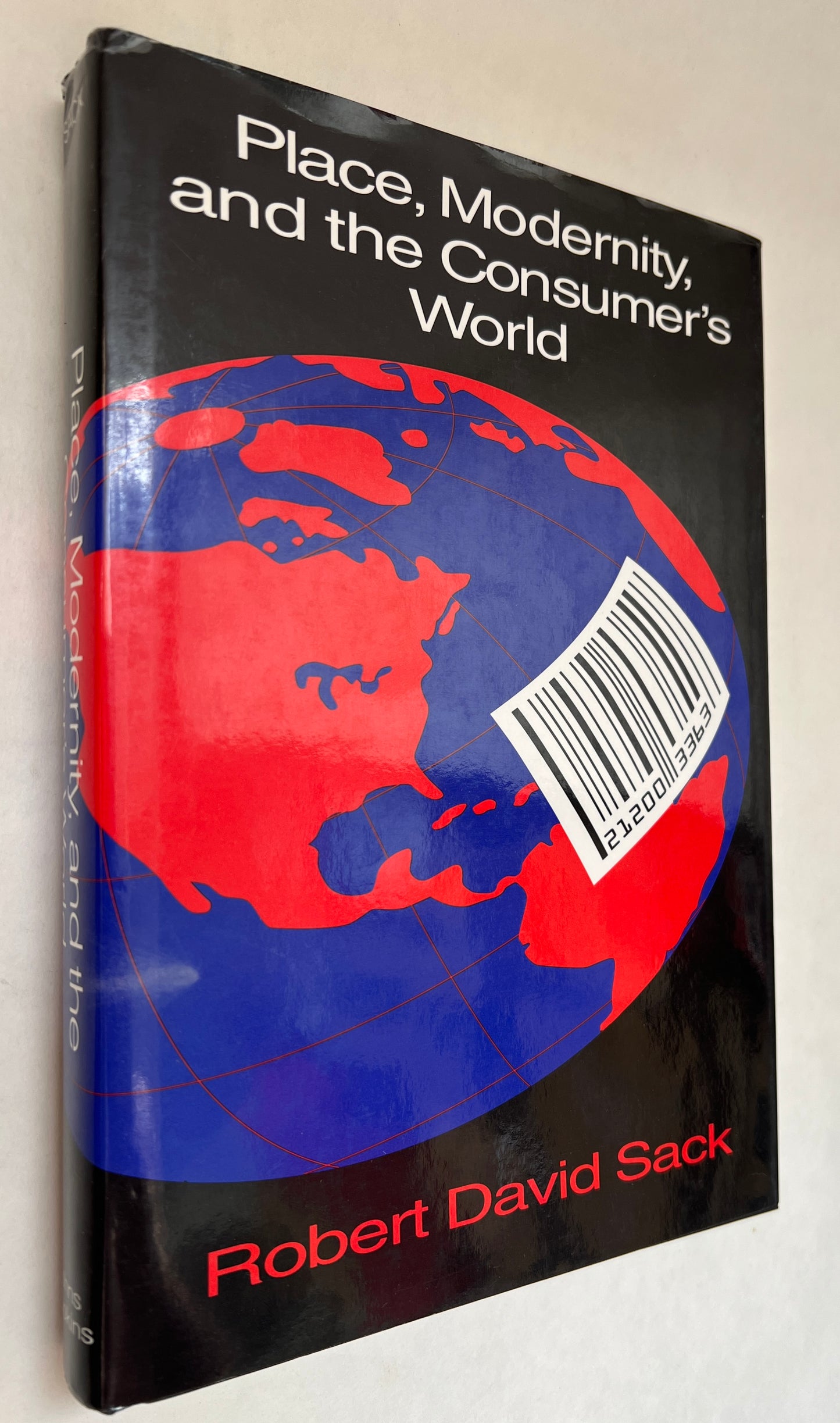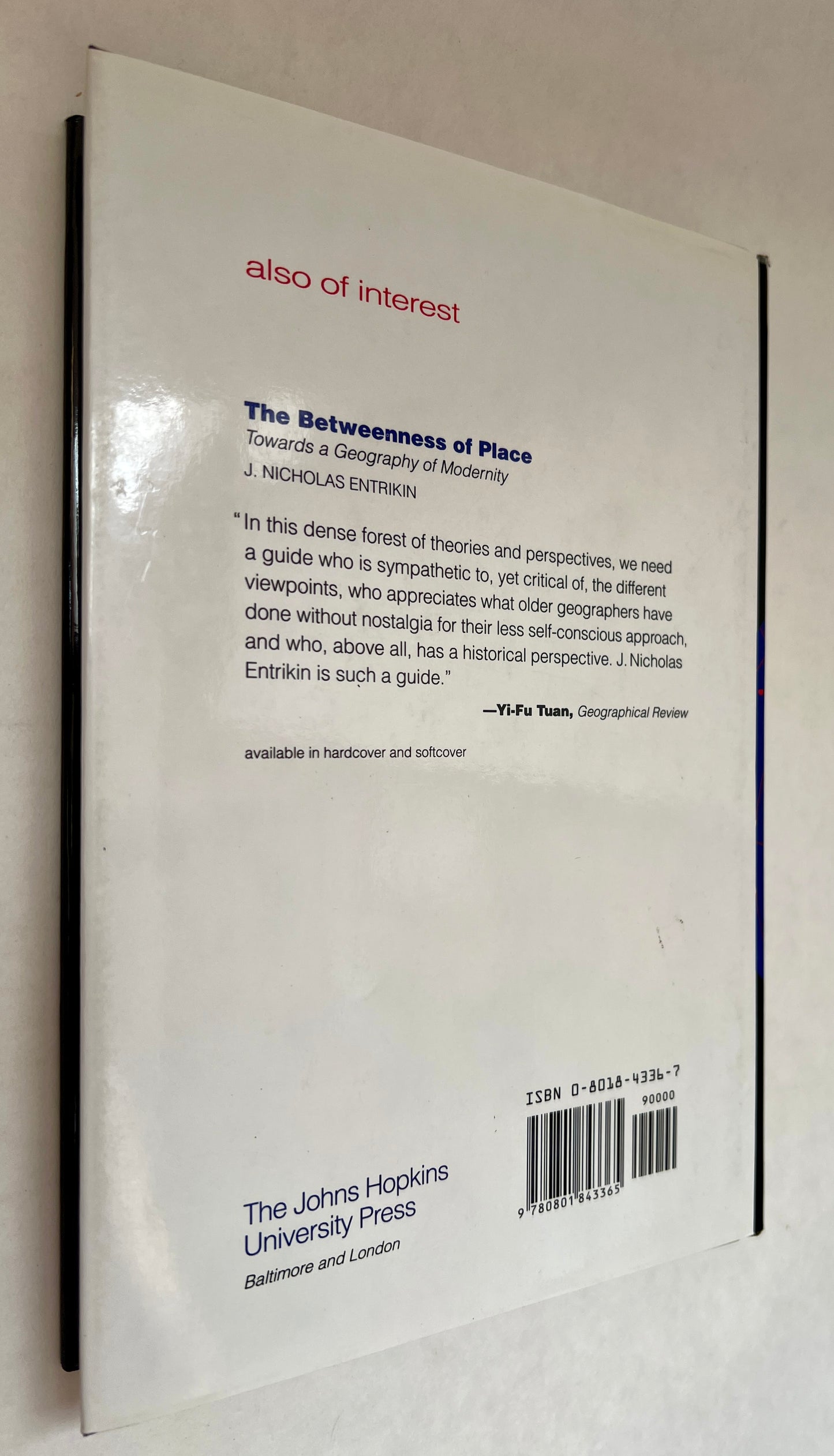Sack, Robert David
Place, Modernity, and the Consumer's World: A Relational Framework for Geographical Analysis
Place, Modernity, and the Consumer's World: A Relational Framework for Geographical Analysis
Couldn't load pickup availability
Baltimore: Johns Hopkins University Press, 1992. Quarto in black pictorial jacket with red and blue; xiv, 256 pages: illustrations; 24 cm Fine in fine(-) jacket. Hardcover. ISBN: 9780801843365, 0801843367
"To create successful consumer places, a retail store may be designed to look like the Australian outback. A museum may have the appearance of a department store. Travel tours may wend through "native" communities that stage "traditional" behavior. Umberto Eco calls this "authentication," or "instances where the American imagination demands the real thing and, to attain it, must fabricate the absolute fake." In Place, Modernity, and the Consumer's World, geographer Robert Sack explores this phenomenon along with other problems of modernity, mass consumption, and advertising to present a dynamic picture of how space and place define the world of the consumer. He begins with the geographical premise that space and place provide a means by which we make sense of the world and through which we act. He expands this premise to form a relational framework for geographical analysis which is used to show how space is embedded in the realms of meaning, nature, and social relations. He proceeds to demonstrate how places are defined by the ways in which they bring together and transform these three realms. Sack then turns to the consumer's world, the shopping malls, department stores, theme parks, and resorts that form "the everyday landscape of mass consumption." He looks at how these places - together with the advertising that idealizes the way products are supposed to create places and contexts - are constructed and how they intentionally alter aspects of reality in such a way as to create those disorienting qualities associated with "postmodernism." Finally, Sack considers place as both an empirical and a moral concept, and establishes a geographical basis for making moral judgments about it. Using that framework, he finds that places of consumption impair judgment because they disguise the relationships between meaning, nature, and social relations."—Publisher. / Contents: 1. Introduction: Places of Consumption and the Relational Framework. Place, Consumption, and Modernity. Modernity. Place, Experience, and Action. Place and Perspectives. Place and Forces. The Relational Framework. A Geographical Model of Consumption. Place, Morality, and the Consumer's World. The Organization of the Book. I. The Relational Framework. 2. Perspectives from Somewhere to Nowhere. Personal Place: A View from Somewhere. Space, Place, and the Child. Territoriality and the Production of Space. Segmented Worlds and Self. Public, Objective Space: A View from Nowhere. 3. The Problem of Agency. Autogenic Actions and Impact. Free Agency and Objectivity. Free Agency and the Laws and Rules of Social Science. 4. Forces from the Realms of Meaning, Nature, and Social Relations. Connections among the Realms. Forces and Perspectives. Space and Place as Forces. II. The Consumer's World. 5. Place and Modern Culture. Personal Place. Utopias. Nationalism. Place and Mass Media. 6. A Geographical Model of Consumption. Consumption and Production. The Loom as a Model of Consumption. Advertising. The Loom's Structure. The Structure of Mass Consumption: The Loom Extended. Historical Influences on the Structure. Internal Dynamics. External Dynamics. 7. Places of Consumption. Stores and Shopping Malls as Commodities. Home as a Commodity. The Workplace. Tourism as a Commodity. Disney World. China, Bloomingdale's, and the Metropolitan Museum of Art. Authenticity. III. Geography and Morality. 8. Place, Morality, and Consumption. Place as a Moral Concept. The Good and the Moral. Consumption and Civility. Geographical Foundations. Moral Philosophy. Geographical Grounds for Agreement. The Consumer's Paradise. Extending Geographical Awareness. 9. Afterword: Geographical Analysis and the World of Consumption. / "Published in cooperation with the Center for American Places, Harrisonburg, Virginia"--Title page verso.
Share




